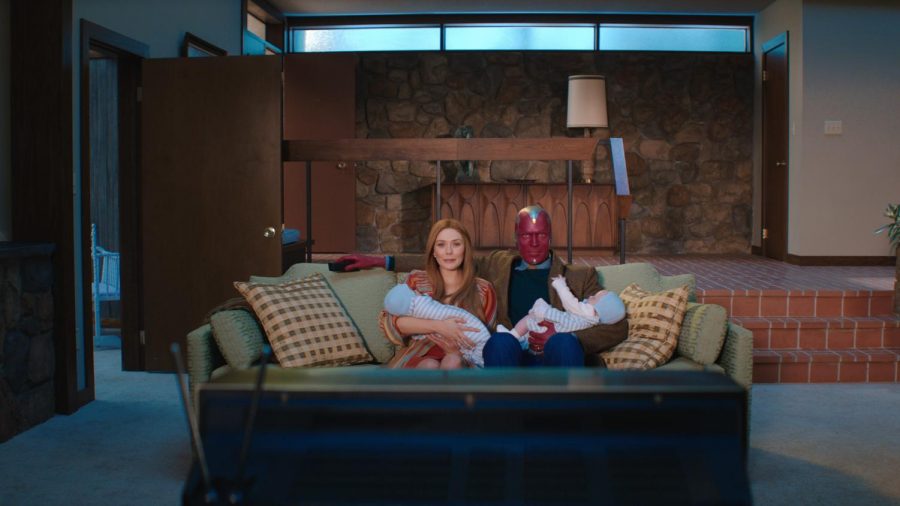WandaVision Review
February 18, 2021
*Mild spoilers for episodes 1-6 of WandaVision*
In recent years, the superhero genre has become near impossible to escape. Studios like DC, Marvel, and Sony are taking the stage and bringing beloved comic-book characters to life. Fans flocked around the Avengers series, a culminating feat of Marvel which brought together their movie characters in a classic fight between good and evil. The last movie of the Avengers, which closed off what Marvel titled “Phase Three” (the first two setting up Endgame), became the highest-grossing film of all time, grossing over $2.7 billion worldwide.
For any studio to sustain success in such a genre, there must be a willingness to innovate on old ideas. Sony created animated hit Spider-Man: Into the Spider-Verse, which became a love letter to comic books by translating the comic styles into animation. Prime Video released The Boys, a cynical satire of the genre that was acclaimed for its subversive humor.
But what could Marvel, which built a passionate following around their cinematic universe, do to build upon it? Marvel recently began releasing episodes of WandaVision, written by Jac Shaeffer and directed by Matt Shakman. The show details Wanda Maximoff (Elizabeth Olsen) and Vision (Paul Bettany), two previous Avengers, seemingly trapped in a suburban sitcom. Paralleling this are Captain Monica Rambeau (Teyonah Parris), Jimmy Woo (Randall Park), and Darcy Lewis (Kat Dennings), who are working to uncover a sprawling missing-persons case, which eventually relates back to Wanda’s faux suburban lifestyle.
Now, before I continue, I must say that I have never a part of the Marvel fanbase. I’ve watched the movies casually, but never with much care. For me, Marvel movies have been fun distractions, but little more. So, when I went to watch WandaVision, a show centering on two characters that I could scarcely remember, I had little expectations besides something enjoyable that I would forget as soon as I finished.
Fortunately for me, I was wrong. With WandaVision, Marvel has created a show that works on many levels: as an amusing homage to sit-com television through the ages, a “Monkey’s-Paw”-esque story of a woman trying and failing to live an unbothered life, and, probably most importantly, a fun, snarky, distinctly “Marvel” superhero show.
As Wanda’s journey continues, so too does her environment. At its inception, it is a 50s style sitcom, fit with the black-and-white overtones, the appropriate wardrobe, and the excessive overacting. As the show continues, it transitions to a 60s, then colorful 70s, and so on, with the most recent episode ending in a 2000s style family sitcom most akin to Malcolm in The Middle. All of these bring with them the quirks of a sitcom, an overarching laugh track and the nonsensical scenarios – one episode details Vision’s drunken magic performance as Wanda tries to keep him tempered. They are a joy to watch, and the humor somehow retains a contemporary nature while staying true to its dated roots. It is quite clear that the show was written with a clear love for television, playing with its elements and adding to them, creating an altogether charming show.
However, from the beginning, it is obvious that the show is not only a sitcom but some dystopian nightmare. Radios imploring Wanda for more information, splashes of color coming from outside elements, and citizens of the town seeming to want nothing more than to leave. As the episodes continue, it becomes clear that it the sitcom is, in fact, Wanda’s attempts to create a new life for her and Vision, who, in reality, was killed by Thanos (in Avengers: Infinity War). In doing so, she has imprisoned and controlled thousands of people into playing characters in suburbia, from which an agency known as SWORD is trying to free them. Olsen plays Wanda wonderfully, allowing watchers to relate to her even in their disgust at her actions. In this way, the show delves into more complex subjects, dealing with ideas of grief and control, which, while not necessarily new, are tackled gracefully and with more depth than I expected. It is a bold step for Marvel to take, but they are making an incredibly personal story unlike anything I had previously associated with them.
Of course, it is still a decidedly “Marvel” piece of television. It employs the same tactics that both a Marvel expert and a novice can point out. There are the witty, likeable characters, the simple but incredibly aggravating villain, and the nonsensical dialogue that is tied with the science of the plot (as far as I know, “Cosmic Background Microwave Radiation” serves little purpose in the plot besides sounding cool). Whether or not these choices are charming and distinguishing or trodden and tired is up to the individual.
Overall, WandaVision represents the best of a genre. It is easy for such a successful studio to fall into regular routine, and certainly, Marvel could do such with little loss. People would continue to flock to the newest film, fueled more by a love for the superhero phenomenon than the movie itself; but Marvel has proved that they are willing and open to innovation, and in the case of WandaVision, I’d deem it an apparent success.



Matthew Tracy • Mar 1, 2021 at 8:10 pm
I know this was written a couple weeks ago, so it’s behind a couple episodes, but it truly is remarkable to see how Marvel captured the emotions Wanda is experiencing. Her pure, undying grief and feelings of hopelessness are perfectly captured in Elizabeth Olsen’s flawless portrayal, as well as hidden symbols and themes that serve to highlight Wanda’s emotions. Since her introduction Wanda has been one of my favorite characters, and Wandavision increased that a thousand fold. This is certainly one of my favorite series to date and I am so excited to see where Marvel will go with Phase Four from here.